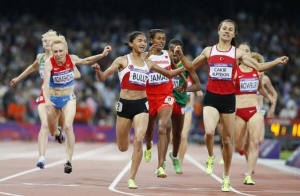|
London 1500 stakes claim as 'dirtiest race'
 Send a link to a friend
Send a link to a friend
 [July 21, 2016]
By Mitch Phillips [July 21, 2016]
By Mitch Phillips
LONDON (Reuters) - The Ben Johnson 1988
Olympic 100 meters final was dubbed "the dirtiest race in history"
but there is a new contender for that dubious honor as the fallout
continues from the drug-ravaged 2012 women's 1500 meters in London.
Four of the first five in the memorable Seoul showdown tested
positive for banned drugs at some point in their career but no less
than six of the top nine in the London 1500, including the gold and
silver medallists, have served bans before or since.
Turkey's muscular powerhouse Asli Cakir Alptekin, who had already
served a two-year doping suspension, crossed the line first but had
the victory annulled and is serving an eight-year ban after
irregularities were found in her biological passport.
Compatriot Gamze Bulut, who had improved her personal best by an
eyebrow-raising 18 seconds in the previous year, finished second but
was also later banned for abnormal blood levels.
Russia's Tatyana Tomashova, who had served a two-year ban up to 2010
for switching urine during a test, finished fourth.
Fifth-placed Ethiopia-born Swede and 2013 world champion Abeba
Aregawi tested positive for meldonium in January this year, although
had her ban was lifted in July due to a lack of clarity over the
drug's properties.

Russian Ekaterina Kostetskaya (seventh) and Belarussian Natallia
Kareiva (ninth), have been subsequently banned, as were two other
athletes from the heats.
Briton Lisa Dobriskey finished 10th in the final and famously said
afterwards: "I'll probably get into trouble for saying this but I
don't believe I'm competing on a level playing field."
Dobriskey said she had raised her concerns with the International
Association of Athletics Federations (IAAF) earlier in the season
when Cakir Alptekin was posting times faster than in the period when
she had previously been doping.
Without proof, nothing could be done.
"HUMILIATED"
The Briton had every right to be frustrated having been cheated out
of a medal at the Beijing Olympics when she was pipped for bronze by
Ukrainian Nataliya Tobias, who later tested positive for
testosterone.
"After the (2012) race I wanted to cry," Dobriskey said recently.
"It should have been a joyous moment in front of my home crowd but I
felt humiliated. I felt I had to apologize for my performance to my
family and friends.
"The most upsetting thing is that I just felt our sport had moved on
so much more from 1988. It should be harder to cheat than back then
but that doesn't seem to be the case."
American Shannon Rowbury finished sixth in London and went through
the same emotional mix of anger and frustration as Dobriskey.
[to top of second column] |

Turkey's Asli Cakir Alptekin (R) wins gold ahead of her compatriot
second placed Gamze Bulut (3rd L) and third placed Bahrain's Maryam
Yusuf Jamal (C) in the women's 1500m final during the London 2012
Olympic Games at the Olympic Stadium August 10, 2012. REUTERS/Lucy
Nicholson

"While those women were doing their victory lap I was sobbing,
trying to get enough control to face my family," she said in a
recent video blog.
Almost four years on, despite the bans, the International Olympic
Committee (IOC) still lists the same race finishing order and has
done nothing about reallocating the medals.
Clean athletes in the race, meanwhile, have had to pick up
information from social media, something Rowbury said just added to
the pain.
"As an athlete whose life and livelihood has been negatively
effected by drug cheats, I would ask for establishing a better
protocol," she told Reuters in an email.
"I did receive a message from (IAAF President) Seb Coe, which I very
much appreciate. He explained some of the complications and said he
hoped to work towards a more timely information process."
Rowbury said she would like to see a re-awarding protocol "that
helps the athlete to regain a small piece of what was robbed from
them".
Her desire is for somebody inheriting a medal, for example, to be
awarded it at the next Olympics rather than receiving it in a brown
envelope.
Rowbury will at least get another chance to make up for her
disappointment in Rio, having qualified for her third Olympics.

Dobriskey, though, after a wretched time with injuries, is set to
head into retirement forever wondering.
(Editing by Nick Mulvenney)
[© 2016 Thomson Reuters. All rights
reserved.]
Copyright 2016 Reuters. All rights reserved. This material may not be published,
broadcast, rewritten or redistributed. |